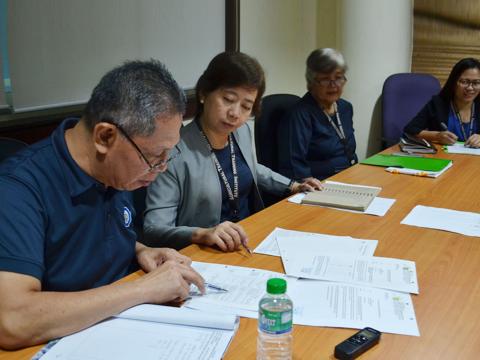TUV-SUD auditor Charlie Labrador goes over the quality processes related to career development and management of the Institute.
DILIMAN, Quezon City – The Agricultural Training Institute (ATI) obtained ISO 9001:2015 certification for the Quality Management System (QMS) of its Central Office and seven expansion training centers, further strengthening its drive for excellence in public service.
The certification attests to the compliance of the QMS of the ATI Central Office and the seven expansion training centers with the standards of the new version of ISO 9001. This version focuses on adopting risk-based thinking for QMS requirements and on the understanding of the organization and its context, particularly external and internal issues relevant to its purpose and strategic direction.
The certification was issued after the audit conducted by TUV-SUD, an internationally recognized management systems solution provider, in the concerned offices on separate dates in November and December 2017. The seven training centers include those in the Cordillera Administrative Region, Regions II, VI, VIII, XII, XIII, and the International Training Center on Pig Husbandry.
The scope of the audit included the development and provision of trainings; knowledge products and services; accreditation of extension service providers; scholarships; alliance building; and national extension system planning, monitoring and evaluation.
Since 2014, the ATI Central Office was able to maintain its ISO 9001:2008 certification. In 2016, the seven expansion training centers was granted certification for their compliance to the standards. The Institute is now set to expand the certification to the remaining nine regional training centers by September 2018 which is the deadline for adapting and transition to the 2015 standards.
ISO 9001 is the international standard that specifies requirements for a QMS, which ensures consistency of products and services through quality processes.
The certification is also in line with Executive Order No. 605, Series of 2007 entitled ‘Institutionalizing the Structure, Mechanisms and Standards to Implement the Government Quality Management Program, Amending for the Purpose Administrative Order No. 161, Series of 2006.’

